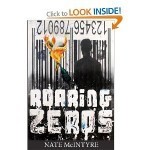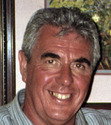Author Interview: Nate McIntyre
Welcome to our series of Author Interviews, where Charlie Bray chats to a variety of Indie writers about their lives and their books.
If you would like to be interviewed, have your book reviewed, and post a guest blog, sign up now to INDIETRIBE GOLD
Earlier this month I was fortunate enough to review Nate McIntyre’s novel, Roaring Zeros, and thoroughly enjoyed the experience.
The book revolves around a revolution, and as with all revolutions, violence and brutality vie for authority with thought and reason and Nate McIntyre paints a very vivid picture of what could well face us all in the not too distant future.
Having read the book, I jumped at the chance to interview the author:
Nate, Tell us a little about yourself.
I’m twenty-eight and currently live in San Diego, California. I have a degree in political science and international relations and am debating grad school in order to improve my career prospects (unless I suddenly become a famous author). I was also enlisted in the Marine Corps Reserve for six years ending in 2009.
In my free time, I follow baseball, listen to tons of punk rock, and enjoy reading, brewing, PC gaming, following politics, and getting lost in the rabbit hole that is Wikipedia.
How long have you been writing?
Roaring Zeros is my first and only attempt (so far) at creative writing, and it took about 3-3.5 years to complete and self-publish. I’ve taken a break from writing in 2013 in order to focus on other things, but am hoping to pick it up again soon.
What inspired you to write Roaring Zeros?
In a nutshell: The global financial crisis that started in 2008.
I graduated right in the middle of the Wall Street collapse and the subsequent bailouts and “Great Recession.” This was also in the thick of the 2008 US election season and Barack Obama’s subsequent inauguration. There was widespread fear that we were heading for a second Great Depression and as someone who has always been really interested in history, that sort of sparked my imagination. The final catalyst in my decision to write came one morning in January 2009 when I saw a breaking news segment on TV about the bank my family and I had our accounts with going under. I had been looking for jobs on my laptop the whole morning wondering how I was going to start paying for my loans and suddenly it felt like I was re-living things my grandparents had told me about from 1929. That’s when it really seemed like we might be in for a rough ride.
Politically, we saw a sharp increase in populism of all sorts. It started with various groups under the Tea Party label and then had a second wave with the Occupy movement in 2011 when I was much further along in writing the story. Europe and the Middle East have had unrest since then too. All of this really did resemble a lot of what I had learned about the Great Depression, and I wanted to explore what a modern repeat might look like for people like my friends and I if the crisis got significantly worse.
What would you say is the main message of your book?
I wanted to show the power of ordinary people and the importance of exercising it when needed. As we’ve seen in recent years, we live in a world where those with power and privilege play by a different set of rules than most of us on the street. People are kind of expected to just accept this as “the way things are,” but under certain conditions, it could easily lead to unrest. I also wanted to explain how people’s own personal frustrations and grievances are often what lead them to act on a greater scale.
Additionally, I wanted to illustrate the dangers of extremism born out of populism and desperation, which you can see in history. The Great Depression played a major role in the rise of fascism in Europe by providing an unstable environment where people were desperate for alternative solutions, whether good or bad. While I think a great deal of today’s populist sentiment is justified, there is always the danger that it could go down the wrong path. Some very recent developments in Europe and elsewhere have made this clear, which you can read more about in my guest blog here on Indietribe.
What are some of your creative influences? Were there any specific ones that inspired Roaring Zeros?
As far as writers, George Orwell is my favorite. Out of his work, I really like Homage to Catalonia and have read it three or four times. In the past, I read a lot of military thrillers by guys like Tom Clancy, and also mixed in some sci-fi and fantasy from time to time. When I was a kid, I read just about every book in Brian Jacques’ Redwall series. These days I read a lot of non-fiction related to history or current events.
I get a lot of inspiration from punk rock music as well and would nominate Greg Graffin of Bad Religion as one of the greatest songwriters of the last century. Some of my ideas for the events in the story were inspired by experiences I’ve had at shows and elsewhere, and by the style of movies like Boondock Saints, SLC Punk, and Fight Club (which was a book first, of course). I like that sort of grittiness and raw emotion and felt it would work well for the type of story I was writing.
In the story, Jason and his friends can be described as antiheros, whose actions some might find questionable. Is there a reason for that?
I wanted the characters to seem real and relatable. So many stories out there have heroes and protagonists that don’t seem like real people. They never make a selfish decision, rarely if ever get angry, and always seem to be totally under control. Most people are not like that and even people historically regarded as heroes had major flaws, you just rarely hear about them. I wanted to show that you don’t have to be a saint to make a difference. Jason and his friends are frustrated young men. Like most their age, they sometimes make rash decisions out of anger and perhaps enjoy a few too many drinks. However, it’s their personal feelings of outrage that lead them to go out and right the wrongs they see in the world around them during a chaotic time. Revolutions are filled with shades of grey by people acting for different reasons, even if their outcomes are generally good. Today would be no different, and for evidence we just need to look at current events in other parts of the world.
Any advice for other indie authors?
Keep at it. Writing a book is a long road, but the sense of personal accomplishment is worth it. Don’t blow your life savings, but be willing to spend a decent amount on things like editing and cover design. If you can find friends with these talents, that’s even better. It’s a great conversation starter once you’re done, too!
Do you have any future projects in the works?
I’ve been contemplating another novel for several months. I have some basic notes and will hopefully expand on those and start drafting soon. To stay updated, you can like my fan page on Facebook (www.facebook.com/RoaringZeros) and follow me on Twitter (www.twitter.com/Commander_Nate).
Having read and reviewed Roaring Zeros I urge you to buy it. It really is a great book. It can be bought here, right now from Amazon.com or Amazon.co.uk
I hope you enjoyed reading Nate’s interview as much as I enjoyed doing it.
I look forward to interviewing more Indie authors soon.
In the meanwhile, very happy reading, Charlie





